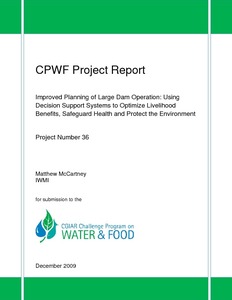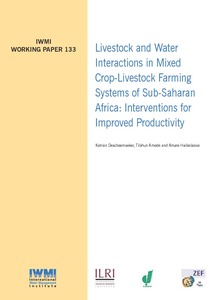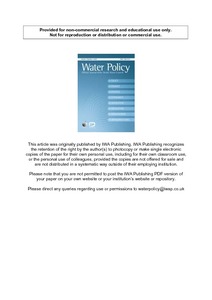Location
The International Water Management Institute (IWMI) is a non-profit, scientific research organization focusing on the sustainable use of water and land resources in developing countries. It is headquartered in Colombo, Sri Lanka, with regional offices across Asia and Africa. IWMI works in partnership with governments, civil society and the private sector to develop scalable agricultural water management solutions that have a real impact on poverty reduction, food security and ecosystem health. IWMI is a member of CGIAR, a global research partnership for a food-secure future.
IWMI’s Mission is to provide evidence-based solutions to sustainably manage water and land resources for food security, people’s livelihoods and the environment.
IWMI’s Vision, as reflected in the Strategy 2014-2018, is ‘a water-secure world’. IWMI targets water and land management challenges faced by poor communities in the developing countries, and through this contributes towards the achievement of the United Nations Millennium Development Goals (MDGs) of reducing poverty and hunger, and maintaining a sustainable environment. These are also the goals of CGIAR.
IWMI works through collaborative research with many partners in the North and South, and targets policymakers, development agencies, individual farmers and private sector organizations.
Resources
Displaying 516 - 520 of 959Adaptive water resource management in the South Indian Lower Bhavani Project Command Area
This report explores the theory and practice of Adaptive Water Management (AWM) based on a detailed field study in the Lower Bhavani Project (LBP) in the South Indian state of Tamil Nadu. A five-step framework is used to analyze the extent to which AWM is practiced and how it could be improved. The analysis shows that the LBP system has increasingly fulfilled the criteria of a complex adaptive system over the years. The main uncertainty factor, rainfall variability, has been considered in a stepwise way during the system change cycles and has been included in the LBP system design.
Improved planning of large dam operation: Using decision support systems to optimize livelihood benefits, safeguard health and protect the environment
Improved Planning of Large Dam Operation: Using Decision Support Systems to Optimize
Livelihood Benefits, Safeguard Health and Protect the Environment. This project was undertaken
with the aim of providing information to assist policy-makers, water resource managers and other
interested stakeholders in the planning and management of large dams in Africa. The project
highlighted the importance of considering environmental and social (including health) issues in
dam planning and operation and illustrated how contemporary Decision Support Systems can be
Livestock and water interactions in mixed crop-livestock farming systems of sub-Saharan Africa: interventions for improved productivity
In sub-Saharan Africa (SSA), the increasing competition for water between various sectors is aggravated by growing demands for water, climate change and environmental degradation. One of the major consumers of water is livestock keeping, which is an important livelihood strategy for smallholder farmers in Africa. The water consumption for livestock production is currently increasing with the growing demands for livestock products. On the other hand, current low returns from livestock, limit its contribution to livelihoods, threaten environmental health and aggravate local conflicts.








